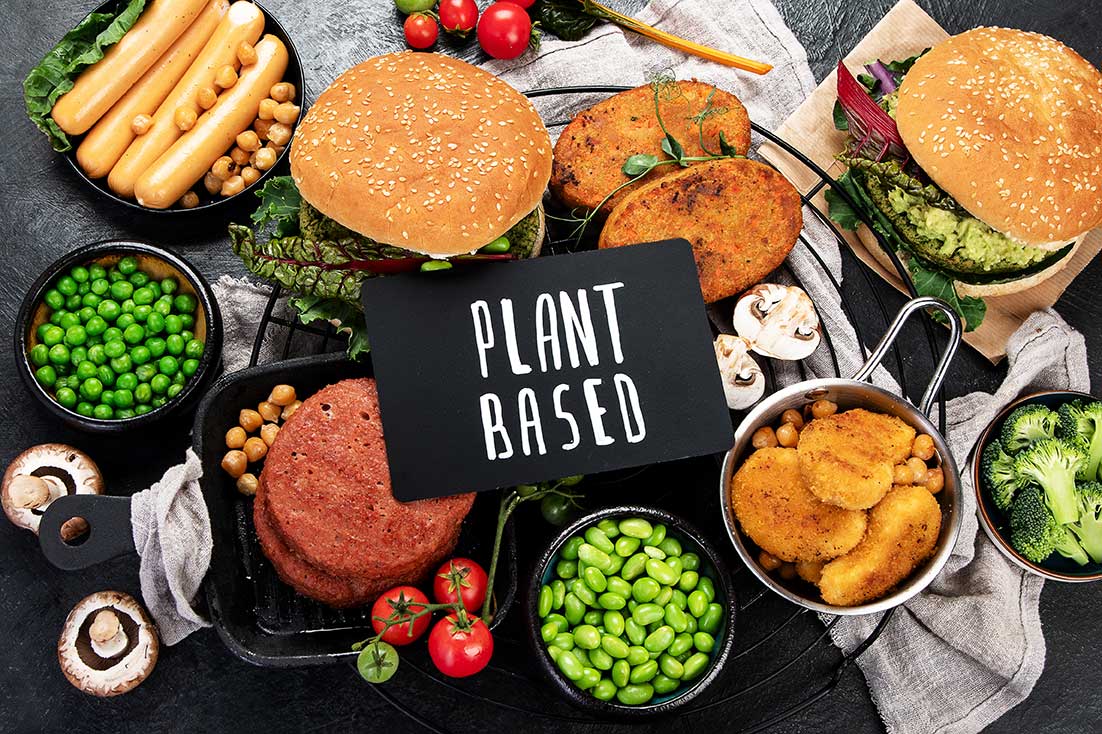All About Healthy Food: Advantages of Taking On Plant Based Choices
The discussion surrounding plant-based diets has gotten substantial interest in the last few years. Numerous individuals are exploring the possible wellness benefits, dietary advantages, and environmental influences connected with these nutritional options. As people come to be extra familiar with their food's influence on well-being and sustainability, inquiries develop regarding the practicalities of taking on such a way of living. What certain changes can one anticipate, and exactly how might these options reshape not just personal health yet likewise the planet's future?
Recognizing Plant-Based Diet Plans
Although lots of people associate plant-based diet regimens generally with vegetarianism or veganism, these diets can incorporate a large range of eating patterns that focus on whole, minimally refined plant foods. Such diet regimens commonly consist of fruits, veggies, entire grains, seeds, nuts, and vegetables, while eliminating or limiting pet products. This versatility permits individuals to tailor their nutritional choices according to nutritional requirements and personal choices. Some may take on a primarily plant-based diet plan while still occasionally consuming meat or milk, typically described as a flexitarian approach. The focus continues to be on integrating even more plant foods, which can bring about a diverse variety of meals and flavors. Recognizing these different analyses of plant-based consuming is essential for appreciating its availability and allure in contemporary food culture.
Health And Wellness Conveniences of Plant-Based Foods
The health benefits of plant-based foods are considerable, using a nutrient density advantage that supports general wellness. Research study shows that these foods can improve heart health and play a necessary duty in effective weight administration. By integrating a lot more plant-based alternatives, people may enhance their dietary selections and advertise long-term health.
Nutrient Density Advantage
Nutrient thickness plays an important function in the wellness advantages of plant-based foods, making them an engaging choice for those looking for a balanced diet. Plant-based foods, such as fruits, vegetables, beans, nuts, and whole grains, are typically rich in important vitamins, minerals, and antioxidants while being lower in calories. This high nutrient density enables individuals to consume fewer calories while still satisfying their dietary needs. Additionally, these foods are loaded with dietary fiber, advertising digestion health and wellness and aiding in weight administration. By incorporating nutrient-dense plant-based options, customers can enhance their overall wellness, sustain their immune systems, and reduce the risk of chronic conditions. Eventually, the nutrient density of plant-based foods underscores their importance in a health-conscious way of living.
Heart Health And Wellness Renovation

Weight Administration Support
In enhancement to advertising heart health and wellness, a plant-based diet can substantially assist in weight monitoring. This dietary strategy highlights entire foods such as fruits, veggies, vegetables, nuts, and whole grains, which are normally lower in calories and greater in fiber contrasted to animal-based products. The high fiber material aids boost satiety, lowering general calorie consumption. Plant-based diet regimens are frequently abundant in necessary nutrients while low in undesirable fats, making it less complicated to maintain a healthy and balanced weight. Research suggests that people that adopt a plant-based way of life tend to have lower body mass indexes (BMIs) and experience more effective weight reduction contrasted to those who consume meat-heavy diet plans. Embracing plant-based options is a tactical option for reliable weight monitoring.
Nutritional Worth of Plant-Based Active Ingredients
Plant-based ingredients are rich in vital nutrients, using a varied selection of vitamins, minerals, and anti-oxidants that add to total wellness. A contrast of healthy protein resources discloses that while pet items are commonly deemed remarkable, numerous plant-based choices supply appropriate protein and other useful compounds. Comprehending the nutritional value of these active ingredients can aid people make notified dietary choices.
Important Nutrients in Plants
Nutrient-rich ingredients found in plants offer a varied variety of vital minerals and vitamins that contribute greatly to total wellness. These components are rich in vitamins A, C, and K, which sustain immune feature, vision, and blood clotting, respectively. In enhancement, plants supply important minerals such as potassium, calcium, and magnesium, essential for heart wellness, muscle mass function, and bone toughness. The existence of fiber in plant-based foods help food digestion and advertises a healthy intestine microbiome. Anti-oxidants, found perfectly in vegetables and fruits, aid combat oxidative stress and anxiety and minimize inflammation. In addition, numerous plant foods are reduced in calories yet high in nutrients, making them an outstanding selection for those seeking to keep a healthy weight while making certain optimal nutrient consumption.
Comparing Healthy Protein Resources
Healthy protein sources vary substantially in their dietary profiles, with plant-based ingredients providing one-of-a-kind advantages. Unlike pet healthy proteins, which commonly consist of saturated fats and cholesterol, plant proteins often tend to be lower in these unhealthy parts. Legumes, nuts, seeds, and entire grains are read this article rich in essential amino acids, fiber, vitamins, and minerals. Lentils supply high protein web content together with substantial iron and folate, while quinoa is a total protein, supplying all nine crucial amino acids. Furthermore, plant-based proteins are usually gone along with by anti-oxidants and phytochemicals that support total wellness. The change to plant-based protein resources not only improves nutritional intake however also lines up with lasting dietary techniques, decreasing ecological impact and advertising lasting health and wellness advantages.
Environmental Effect of Plant-Based Consuming
As awareness of environment adjustment grows, lots of individuals are checking out lasting nutritional choices that can substantially lessen their ecological impact. Plant-based eating has become a substantial contributor to minimizing greenhouse read here gas exhausts, which are primarily related to animals manufacturing. The cultivation of fruits, grains, vegetables, and vegetables typically requires fewer resources, such as water and land, compared to pet farming. In addition, plant-based diet regimens can lead to decreased deforestation, as less land is needed for grazing livestock or growing animal feed. By moving in the direction of plant-based alternatives, customers can sustain biodiversity and advertise much healthier communities. In general, accepting plant-based eating not only benefits personal health and wellness however likewise stands for a crucial action toward environmental sustainability and conservation efforts.
Conquering Common Misconceptions
While lots of people acknowledge the advantages of a plant-based diet plan, a number of misconceptions frequently discourage them from totally accepting this way of life. A typical belief is that plant-based diets do not have sufficient protein; however, countless plant sources, such as legumes, nuts, and tofu, provide ample protein. Additionally, some think that this diet plan is costly, when as a matter of fact, staples like beans, rice, and seasonal veggies can be fairly budget-friendly. One more misunderstanding is that plant-based consuming is excessively restrictive, whereas it in fact uses a diverse array of tastes and foods. Lastly, numerous worry that a plant-based diet regimen might result in deficiencies, yet with correct planning, people can get all necessary nutrients, consisting of minerals and vitamins, while delighting in a wide array of tasty dishes.
Tips for Transitioning to a Plant-Based Way of life
Making the change to a plant-based way of life can be an enhancing experience, though it often needs some advice to navigate the initial adjustments. Initially, people are encouraged to begin gradually, integrating even more fruits, vegetables, vegetables, and entire grains into their dishes while decreasing meat and dairy products intake. Meal preparation is important; preparing a regular food selection can aid reduce the modification and stop final harmful choices. Exploring brand-new dishes and cooking methods can additionally improve the experience and preserve exhilaration about plant-based eating. Furthermore, joining support system or areas can provide inspiration and share valuable tips. Remaining notified regarding nutrition assurances balanced meals, preventing shortages while cultivating a healthy and balanced, gratifying plant-based way of life.
Delicious Plant-Based Dish Concepts
Exploring tasty visit this site right here plant-based dish ideas can influence people to welcome a more healthy diet regimen. One popular choice is a passionate quinoa salad, including cherry tomatoes, cucumber, and a tangy lemon-tahini clothing. An additional fave is a tasty lentil stew, packed with carrots, celery, and great smelling natural herbs, perfect for a soothing supper. For morning meal, over night oats made with almond milk, chia seeds, and topped with fresh berries offer a healthy begin to the day. In addition, a vibrant vegetable stir-fry with tofu and a variety of vibrant veggies can be a quick yet pleasing dish. Ultimately, luscious avocado salute on whole-grain bread, sprayed with spices and seeds, provides a basic yet delicious treat. These dishes display the selection and splendor of plant-based consuming.

Regularly Asked Concerns
Can a Plant-Based Diet Provide Sufficient Protein?
The inquiry of whether a plant-based diet can supply sufficient healthy protein prevails. Various sources, consisting of vegetables, nuts, seeds, and whole grains, can fulfill protein requires efficiently, supporting a well balanced and nutritious diet plan for individuals.
Are Plant-Based Diet Regimens Suitable for Kid?
The suitability of plant-based diet plans for children relies on mindful planning. Ample nutrients need to be assured, including vitamins, healthy proteins, and minerals. With proper support, such diet regimens can support healthy and balanced development and development in youngsters.
How Do I Eat in restaurants on a Plant-Based Diet regimen?
Dining out on a plant-based diet plan entails looking for restaurants with varied food selections, asking for adjustments, and discovering vegan-friendly options. Planning ahead and connecting nutritional preferences can improve the eating experience while keeping nutritional choices.
What Prevail Irritants in Plant-Based Foods?
Usual allergens in plant-based foods include soy, gluten, nuts, and seeds - Gluten Free BBQ Sauce. People following a plant-based diet plan must understand these irritants and read labels thoroughly to prevent negative responses and assure secure consumption
Can Plant-Based Diets Aid With Weight-loss?
Study shows that taking on a plant-based diet regimen might facilitate weight management because of its normally reduced calorie thickness and greater fiber material. This mix can enhance satiety, helping people handle their calorie consumption successfully. Lots of individuals connect plant-based diet plans primarily with vegetarianism or veganism, these diet plans can encompass a wide range of consuming patterns that focus on whole, minimally processed plant foods. Nutrient density plays an essential role in the wellness advantages of plant-based foods, making them a compelling choice for those seeking a well balanced diet regimen. Plant-based diet plans have been shown to markedly boost heart health and wellness, as they commonly include elements that sustain cardiovascular function. In enhancement to advertising heart health, a plant-based diet can substantially help in weight management. An usual idea is that plant-based diets do not have adequate protein; nonetheless, many plant sources, such as beans, nuts, and tofu, offer ample healthy protein.
Comments on “Exploring the Rise of Plant Based Chicken in Miami Restaurants”